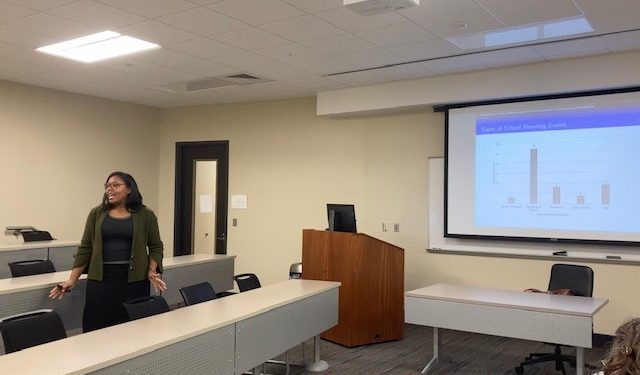On Tuesday, Nov. 15, Yolunda Nabors, Tennessee Tech University economics professor, presented her paper “The Invisible Costs of School Shootings: Impacts on Parents’ Mental Health and Children’s Educational Expectations” to the Brock School of Business. The purpose of this presentation was to show the negative impacts school shootings have on the educational aspirations of children as well as the mental health of their parents.
“I believe there is a major gap in the literature,” Nabors said. “What happens to the parents? Each of these students belongs to a home. How does the exposure to school shootings affect parents?”
In this study, a school shooting is defined as when “a gun is brandished, a gun is fired or a bullet hits school property for any reason, regardless of victims, time or any other reason.”
Since Columbine, more than 320,000 students have been exposed to gun violence at school, according to the Washington Post. So far, over 35 school shootings have occurred in 2022, including one as recently as Nov. 13 at the University of Virginia.
The research for this paper primarily comes from the Fragile Families and Child Wellbeing Study performed by Princeton and Columbia University. This study focuses on children born between 1998 and 2000 as well as the parents of these children. Over 4,000 children in varying cities have been interviewed for this survey at different times during their lives.
Nabors has taken questions from before and after school shootings to gather the data for her paper. She focused on questions related to satisfaction with life and the child’s educational expectations, factors that proved to be directly impacted by school shootings.
The study also looked deeply at the impact school shootings had on mental health. After a school shooting, more parents said they were less satisfied with life than before the event. The parents themselves experience PTSD, depression and anxiety due to their child’s exposure to this kind of trauma. Studies show that parents would often neglect their own mental health in order to help their child.
Nabors was already aware that students impacted by gun violence at school were less likely to graduate or attend college, but she wanted to know more about the change in their aspirations after the shootings. She wanted to understand why the data showed this.
Nabors said, “It has been shown that children exposed to trauma are more likely to have a pessimistic view about the future. It could be the case that if I am exposed to a school shooting, I now have this dismal view of the world. I may not look toward the future as I once did.”
In the Fragile Families and Child Wellbeing Survey, children were asked how likely they were to attend college and the importance of attending college. The answers to both of these questions were negatively impacted by the amount of school shootings that happened where the child lived. After a school shooting, the child was also less likely to think that their parents found college important.
Gun violence in a school affects not only a child’s educational aspirations but also their parent’s mental health. These are two outcomes that are often not mentioned in relation to school shootings, but with the increasing number of gun-related violence in schools, they need to be addressed. Each of these children have parents who have to face the reality that schools are not always safe. These parents expected their schools to protect their children, and instead, their children were exposed to trauma. Nabors’ presentation showed that each of these children have a future ahead of them which can be forced onto a new path after exposure to school shootings.

Arts & Life Editor






